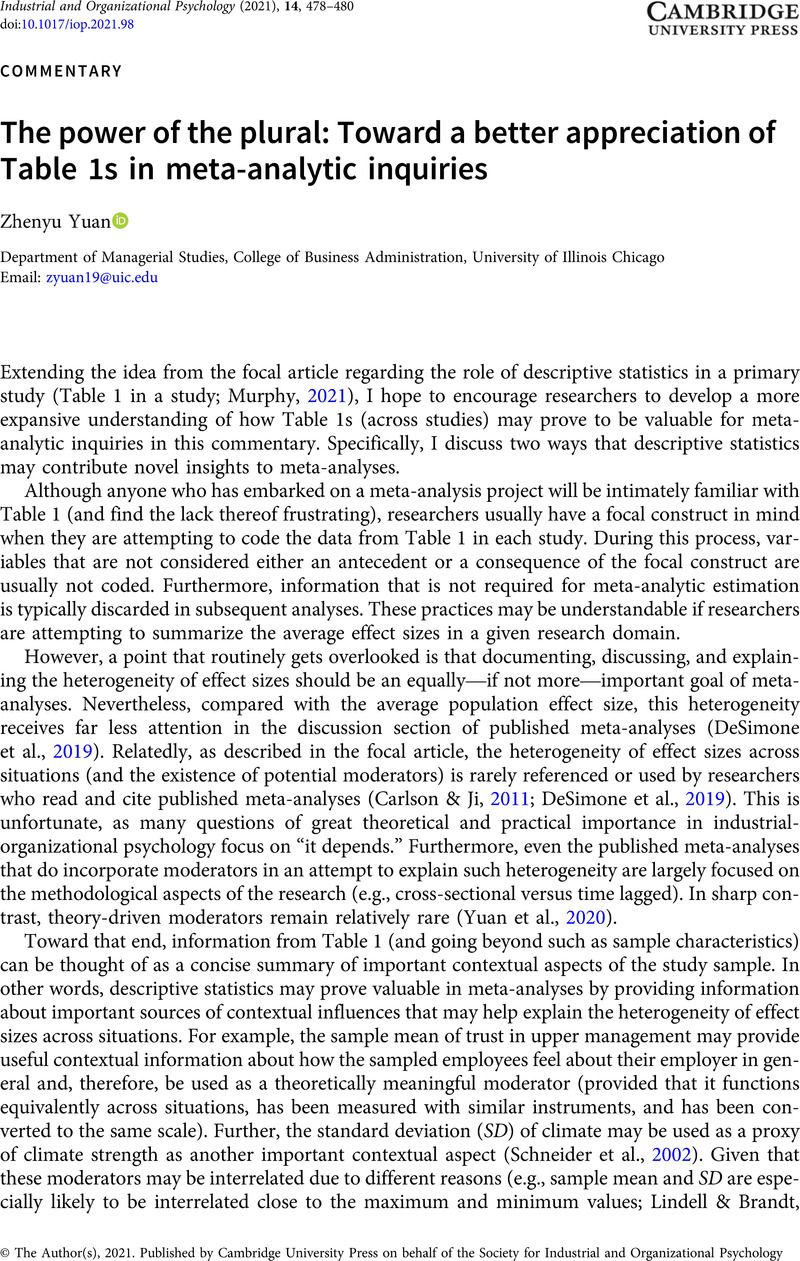No CrossRef data available.
Article contents
The power of the plural: Toward a better appreciation of Table 1s in meta-analytic inquiries
Published online by Cambridge University Press: 14 December 2021
Abstract
An abstract is not available for this content so a preview has been provided. Please use the Get access link above for information on how to access this content.

- Type
- Commentaries
- Information
- Copyright
- © The Author(s), 2021. Published by Cambridge University Press on behalf of the Society for Industrial and Organizational Psychology
References
American Psychological Association. (2020). Publication manual of the American Psychological Association (7th ed.). American Psychological Association. https://doi.org/10.1037/0000165-000
Google Scholar
Carlson, K. D., & Ji, F. X. (2011). Citing and building on meta-analytic findings: Areview and recommendations. Organizational Research Methods, 14(4), 696–717. https://doi.org/10.1177/1094428110384272
CrossRefGoogle Scholar
DeSimone, J. A., Köhler, T., & Schoen, J. L. (2019). If it were only that easy: The use of meta-analytic research by organizational scholars. Organizational Research Methods, 22(4), 867–891. https://doi.org/10.1177/1094428118756743
CrossRefGoogle Scholar
de Wit, F. R. C., Greer, L. L., & Jehn, K. A. (2012). The paradox of intragroup conflict: Ameta-analysis. Journal of Applied Psychology, 97(2), 360–390. https://doi.org/10.1037/a0024844
CrossRefGoogle Scholar
James, L. R., Demaree, R. G., Mulaik, S. A., & Ladd, R. T. (1992). Validity generalization in the context of situational models. Journal of Applied Psychology, 77(1), 3–14. https://doi.org/10.1037/0021-9010.77.1.3
CrossRefGoogle Scholar
Köhler, T., Cortina, J. M., Kurtessis, J. N., & Gölz, M. (2015). Are we correcting correctly? Interdependence of reliabilities in meta-analysis. Organizational Research Methods, 18(3), 355–428. https://doi.org/10.1177/1094428114563617
CrossRefGoogle Scholar
Lindell, M. K., & Brandt, C. J. (2000). Climate quality and climate consensus as mediators of the relationship between organizational antecedents and outcomes. Journal of Applied Psychology, 85(3), 331–348. https://doi.org/10.1037/0021-9010.85.3.331
CrossRefGoogle ScholarPubMed
Murphy, K. (2021). In praise of Table 1: The importance of making better use of descriptive statistics. Industrial and Organizational Psychology: Perspectives on Science and Practice, 14(4), 461–477.Google Scholar
Schmidt, F. L., & Hunter, J. E. (2015). Methods of meta-analysis: Correcting error and bias in research findings. Sage.10.4135/9781483398105CrossRefGoogle Scholar
Schneider, B., Salvaggio, A. N., & Subirats, M. (2002). Climate strength: Anew direction for climate research. Journal of Applied Psychology, 87(2), 220–229. https://doi.org/10.1037/0021-9010.87.2.220
CrossRefGoogle Scholar
Steel, P. D., & Kammeyer-Mueller, J. D. (2002). Comparing meta-analytic moderator estimation techniques under realistic conditions. Journal of Applied Psychology, 87(1), 96–111. https://doi.org/10.1037/0021-9010.87.1.96
CrossRefGoogle ScholarPubMed
Yuan, Z., Morgeson, F. P., & LeBreton, J. M. (2020). Maybe not so independent after all: The possibility, prevalence, and consequences of violating the independence assumptions in psychometric meta-analysis. Personnel Psychology, 73(3), 491–516. https://doi.org/10.1111/peps.12372
CrossRefGoogle Scholar




